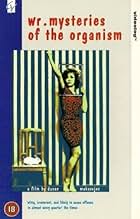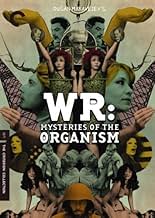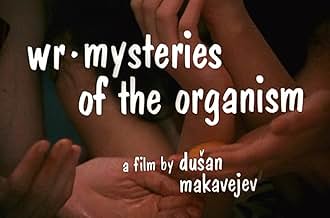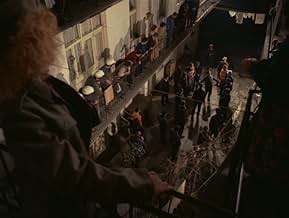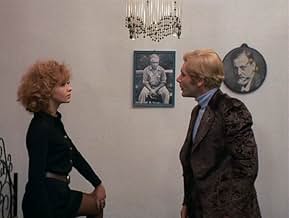IMDb-BEWERTUNG
6,6/10
5664
IHRE BEWERTUNG
Füge eine Handlung in deiner Sprache hinzuAn homage to the work of psychologist Wilhelm Reich, matched with a story about a Yugoslavian girl's affair with a Russian skater.An homage to the work of psychologist Wilhelm Reich, matched with a story about a Yugoslavian girl's affair with a Russian skater.An homage to the work of psychologist Wilhelm Reich, matched with a story about a Yugoslavian girl's affair with a Russian skater.
- Auszeichnungen
- 3 wins total
Mikheil Gelovani
- Joseph Stalin
- (Archivfilmmaterial)
Zedong Mao
- Self
- (Archivfilmmaterial)
- (as Mao Zedong)
Wilhelm Reich
- Self
- (Archivfilmmaterial)
David Henry Bradley Jr.
- Self
- (Nicht genannt)
Empfohlene Bewertungen
Directed by Serbian filmmaker Dusan Makavejev (also known for directing 'Sweet Movie', and the Australian produced 'The Coca-cola Kid'), the film mixes documentary and narrative cinema, to comment on the infiltration of Soviet Communism, sexual politics/sexual revolution, in a political satire. The main drive of the film to begin with is the work of Austrian-American psychiatrist and psychoanalyst, Dr Wilhelm Reich: His theories of Organon therapy (use of static electricity), and the connection between neuroses in people that is rooted in physical, sexual and social surroundings. This connects also with the work of Alexander Lowen, an American psychotherapist (and student of Reich's), who practices and teaches Bioenergetic analysis which uses therapeutic body work to associate the mind with the body, and in theory release repressed energy through the body sexually without the act of physical sex. I observed in these sequences a kind of connection to the work of Arthur Janov, and his primal scream therapy.
The narrative section of the film tells the story of Milena (Milena Dravic) and her sexually promiscuous flatmate Jagoda (Jagoda Kaloper), and their theories and speeches of sexual revolution: "The October revolution was ruined when socialism rejected free love". They meet a Russian communist figure skater, Ivica (Vladimir Ilivich), who they seduce. But Milena soon discovers that communism has no time for sexuality unless it is first met with physical violence. This seems to be a metaphor for the struggle against Stalinist communism within Yugoslavia since the second world war. But in the film Ivica seems somewhat deluded by the concept of communism (as he states, "communism is a Latin word meaning communal), whilst almost being made rigid by the sexual intentions of Milena.
The most interesting part of the film is the first part that focuses on the life and work of Wilhem Reich (hence the W. R. in the films title). He first started working in psychoanalysis with Sigmund Freud in the 1920's, but after writing books such as 'The Mass Psychology of Fascism', fled Austria for America, where he settled in Maine. He worked on his theories of orgone therapy, and developed the orgone accumulator, an organic box lined with lead that individuals would sit in and is theorised as giving both therapy to the bodies organs and to sexuality (The use of the orgone accumulator was even endorsed by William S. Burroughs.). Eventually Reich was arrested (more than likely the victim of situation - i.e. he was from behind the iron curtain), and viewed as insane - despite being tried in court. All of his books were burned in New York, supervised by the federal food and drugs administration agents (take from that what you will).
It is an interesting film. The different strands are connected by the theories of Wilhelm Reich. But it's one of those films that is probably more interesting to talk about than watch as it is incredibly slow moving, and at times seems to focus on activities (such as bioenergetic analysis), as group fad, and seems to almost fall into a 'new age' enlightenment message. Released in 1971, this would make sense, as the sexual revolution was in full 'swing'. Despite all of this it is a relatively enjoyable piece of cinema, with some nice ideas in it. But again, the life of W R far outshines the film as a whole.
www.the-wrath-of-blog.blogspot.com
The narrative section of the film tells the story of Milena (Milena Dravic) and her sexually promiscuous flatmate Jagoda (Jagoda Kaloper), and their theories and speeches of sexual revolution: "The October revolution was ruined when socialism rejected free love". They meet a Russian communist figure skater, Ivica (Vladimir Ilivich), who they seduce. But Milena soon discovers that communism has no time for sexuality unless it is first met with physical violence. This seems to be a metaphor for the struggle against Stalinist communism within Yugoslavia since the second world war. But in the film Ivica seems somewhat deluded by the concept of communism (as he states, "communism is a Latin word meaning communal), whilst almost being made rigid by the sexual intentions of Milena.
The most interesting part of the film is the first part that focuses on the life and work of Wilhem Reich (hence the W. R. in the films title). He first started working in psychoanalysis with Sigmund Freud in the 1920's, but after writing books such as 'The Mass Psychology of Fascism', fled Austria for America, where he settled in Maine. He worked on his theories of orgone therapy, and developed the orgone accumulator, an organic box lined with lead that individuals would sit in and is theorised as giving both therapy to the bodies organs and to sexuality (The use of the orgone accumulator was even endorsed by William S. Burroughs.). Eventually Reich was arrested (more than likely the victim of situation - i.e. he was from behind the iron curtain), and viewed as insane - despite being tried in court. All of his books were burned in New York, supervised by the federal food and drugs administration agents (take from that what you will).
It is an interesting film. The different strands are connected by the theories of Wilhelm Reich. But it's one of those films that is probably more interesting to talk about than watch as it is incredibly slow moving, and at times seems to focus on activities (such as bioenergetic analysis), as group fad, and seems to almost fall into a 'new age' enlightenment message. Released in 1971, this would make sense, as the sexual revolution was in full 'swing'. Despite all of this it is a relatively enjoyable piece of cinema, with some nice ideas in it. But again, the life of W R far outshines the film as a whole.
www.the-wrath-of-blog.blogspot.com
10theemu
Makavejev was always one of the clowns of the Third Cinema, and WR, his masterpiece, is no exception. Makavejev interweaves fiction, documentary, and found audio and video clips (a Stalinist propaganda film, electro-shock treatment footage) to create a fantastically bizarre but intelligent discussion of both the orgone energy theory of Wilhelm Reich and the relationship between Yugoslavia and the USSR in a post-Stalinist era.
I know. It sounds tedious, but it isn't. In fact, it's really fascinating. Among the clips Makavejev (a film theoretician in his own right, WR harkens back to the pre-Stalinist era of Soviet Montage) assembles are footage of performance art by the Yippie poet/singer Tuli Kapferberg and documentary clips of Jim Buckley, an editor for Screw Magazine, getting a mold of his penis made.
WR is bizarre, dogmatic, and at times, hard to watch, but having seen it twice now, I've come to appreciate its ways. By the time Vladimir breaks into song at the film's end, you'll be smiling too.
I know. It sounds tedious, but it isn't. In fact, it's really fascinating. Among the clips Makavejev (a film theoretician in his own right, WR harkens back to the pre-Stalinist era of Soviet Montage) assembles are footage of performance art by the Yippie poet/singer Tuli Kapferberg and documentary clips of Jim Buckley, an editor for Screw Magazine, getting a mold of his penis made.
WR is bizarre, dogmatic, and at times, hard to watch, but having seen it twice now, I've come to appreciate its ways. By the time Vladimir breaks into song at the film's end, you'll be smiling too.
WR is one of my two favorite films, and is widely considered by people knowledgable about the film and the era as "one of the most profound and humerous films of the decade". I call it the "Citizen Kane of the Sixties" because it did what the first "Citizen Kane" did earlier - it summarized the realities we all were living with in the Sixites in the Global Village - the reality of sexual repression in both the East and West, the horrors of the McCarthy Era in this country, the obsession with sports in Russia, etc., etc. It is no accident that a still from this film is on the cover of one of the greatest books on film, "Film As a Subversive Art" by film critic and founder of the NY Film Festival, Amos Vogel. I can understand why many Americans do NOT understand this film - the organization of the film, the two overlapping storylines, the music - all so different from the Hollywood material. However, it is considered by many including myself to be a masterpiece, as are all the films by its director, Dusan Makavejev. Together, he and Jean-Luc Godard are the two "Picassos" of film since WW II - and should both be held as two of the greatest filmmakers of all time.
The plot concentrates on Wilhelm Reich's controversial vital energy
Reich believes that unless a mysterious universal phenomenon called "orgone energy" is discharged naturally through sexual union, obsessions and compulsions will erupt...
The film is a collection of these sorts of neuroses, done with exceptional skill and comic action, set in modern-day Yugoslavia The main character is Milena Dravic, who shouts from her heavily populated apartment: "Politics is for those whose orgasm is incomplete!" Complimenting the idealistic Milena are two female sexologists who are obsessed with the physical nature of human relations...
The film is a blast at repression of any kindpolitical or moraland a poem to uninhibited sexual intercourse... Repression sickens and enslaves, whereas nature's physical pleasure sets the human spirit free
There is an abundance of vivacious sexual encounters, much nudity, and constant immersing into other social taboos, but the film's coup de grâce is a natural mixing of erotica, humor, and politics...
The film is a collection of these sorts of neuroses, done with exceptional skill and comic action, set in modern-day Yugoslavia The main character is Milena Dravic, who shouts from her heavily populated apartment: "Politics is for those whose orgasm is incomplete!" Complimenting the idealistic Milena are two female sexologists who are obsessed with the physical nature of human relations...
The film is a blast at repression of any kindpolitical or moraland a poem to uninhibited sexual intercourse... Repression sickens and enslaves, whereas nature's physical pleasure sets the human spirit free
There is an abundance of vivacious sexual encounters, much nudity, and constant immersing into other social taboos, but the film's coup de grâce is a natural mixing of erotica, humor, and politics...
I completely disagree with the comments of the previous reviewer. Personally knowing very little about the Orgone or Wilhelm Reich, I derived great enjoyment from this film. In fact, I popped in on the TV just to get an idea of its style and structure (without planning to watch it right then) and ended up getting sucked in and watched it all the way through. Makavejev's filmmaking (that I've seen) is quite different from the norm, but not in an overly self-conscious or self-serving way, like Hal Hartley's efforts. "WR" is egoless, simply using film to draw parallels and make observations that are done quite effectively in Makavejev's unique style. It reminded me of the "I am Curious" films, but those are also a bit too self-conscious for me. I also highly recommend Sweet Movie, a later film of his. I only wanted to post these comments in light of the previous user's comments, as we should all remain aware of how subjective one's tastes are from another's. I didn't like the previous user making such blanket statements like "I suppose it might be watchable enough for people who are familiar with Reich, but if you aren't, then I strongly urge you to avoid this film at all costs." when tastes are obviously so variant - remember, I knew barely anything about WR or the Orgone, and enjoyed the film tremendously. Thanks for your time.
Wusstest du schon
- WissenswertesBanned in Yugoslavia immediately after release.
- Zitate
Narrator: Comrade lovers, for your health's sake, fuck freely!
- Alternative VersionenAlthough this film was passed uncut for UK cinemas upon its original release, the 1995 Connoisseur Video release used an edited print which was shown on Channel 4 as part of a 1991 censorship season. This TV version used psychedelic computer generated masking techniques to hide some of the more explicit details, including genuine sex during the opening Soviet sex education film, the images on the wall paintings showing people masturbating, and all shots of Jim Buckley's penis as a plaster cast is made of it (which was obscured by digitally animated stars).
- VerbindungenEdited from Der Schwur (1946)
Top-Auswahl
Melde dich zum Bewerten an und greife auf die Watchlist für personalisierte Empfehlungen zu.
- How long is WR: Mysteries of the Organism?Powered by Alexa
Details
- Erscheinungsdatum
- Herkunftsländer
- Sprachen
- Auch bekannt als
- WR: Mysteries of the Organism
- Drehorte
- Rangeley, Maine, USA(Wilhelm Reich Museum/commune and town scenes)
- Produktionsfirmen
- Weitere beteiligte Unternehmen bei IMDbPro anzeigen
- Laufzeit1 Stunde 24 Minuten
- Farbe
- Sound-Mix
- Seitenverhältnis
- 1.37 : 1
Zu dieser Seite beitragen
Bearbeitung vorschlagen oder fehlenden Inhalt hinzufügen

Oberste Lücke
By what name was W.R. - Mysterien des Organismus (1971) officially released in India in English?
Antwort

